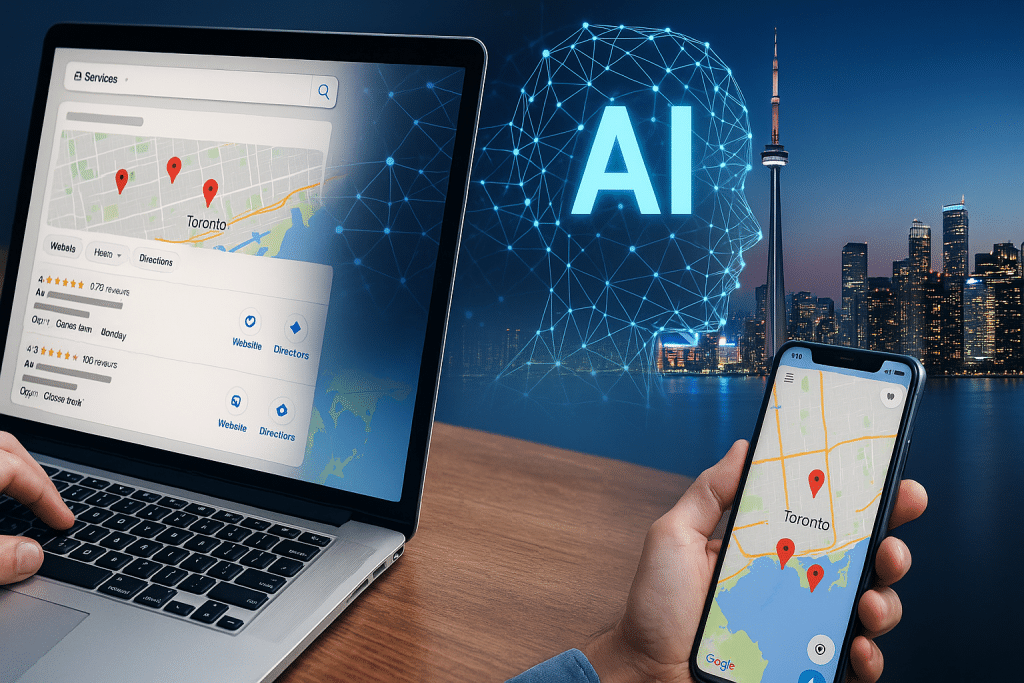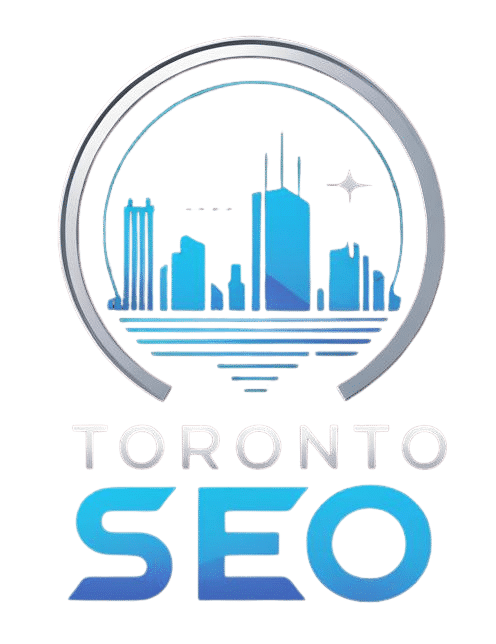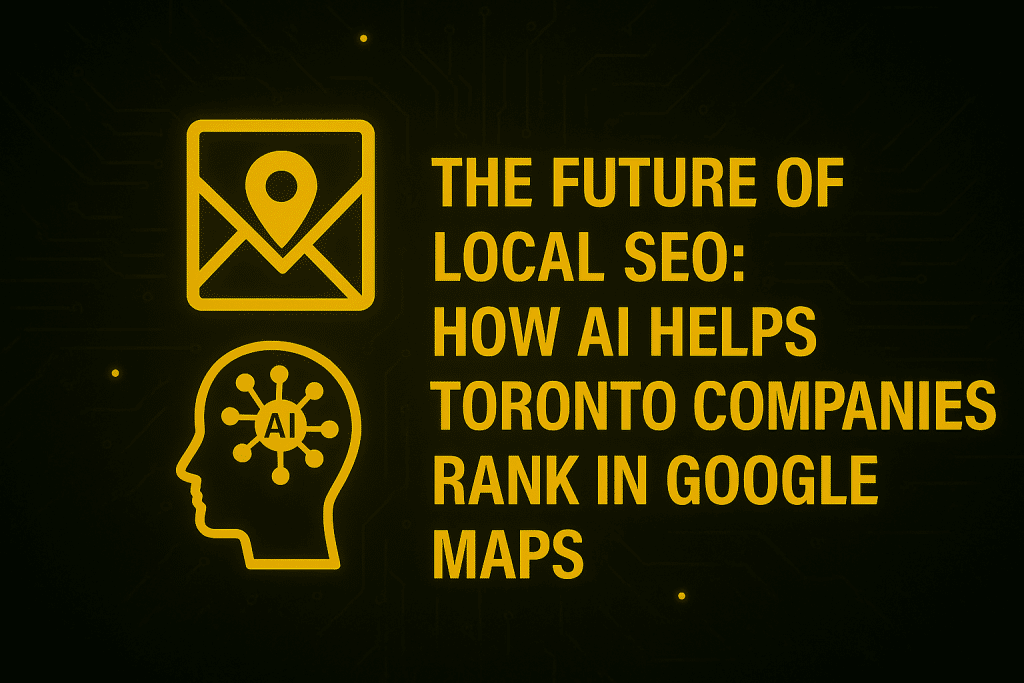Toronto’s business landscape is becoming more competitive every year. From small family-owned shops to large service providers, visibility on Google Maps is no longer optional—it is mission-critical. As artificial intelligence (AI) continues to redefine search engines, local SEO has entered a new era. Companies that leverage AI-powered tools and strategies are the ones rising to the top of Google Maps, earning coveted placements in the local 3-pack and attracting a steady flow of qualified leads.
This article explores the future of local SEO in Toronto, focusing on how AI is changing the rules of the game and what businesses must do today to rank effectively in Google Maps.
The Importance of Google Maps for Toronto Businesses
Why Google Maps Rankings Matter
For local businesses in Toronto—whether you’re a law firm on Bay Street, a spa in Yorkville, or a moving company in Scarborough—Google Maps is the first stop for customers. More than 70% of mobile users who search for a local service end up visiting a business within 24 hours. High visibility in Google Maps translates directly into foot traffic, phone calls, and new revenue.
The Rise of AI-Powered Local Search
Google has been integrating AI into its local search ecosystem for years. From Google’s AI Overviews to machine learning-driven ranking factors, AI now influences how businesses appear on Maps. In Toronto, where industries are saturated, this AI-driven shift is separating proactive companies from those stuck in outdated tactics.
How AI Shapes Local SEO in 2025 and Beyond
1. AI-Enhanced Entity Understanding
Google now prioritizes businesses not just by keywords, but by how they are understood as entities. This means Toronto businesses need more than just optimized titles—they need consistent citations, structured data, and digital signals that establish credibility. Citation building still matters in 2025, but AI has raised the bar: Google interprets brand mentions, customer reviews, and authority references to decide who shows up in Maps.
2. Reviews and Sentiment Analysis
AI doesn’t just count reviews; it evaluates tone, language, and sentiment. For Toronto restaurants, dentists, or real estate agents, a handful of detailed, positive reviews carry more weight than dozens of generic ones. AI-powered algorithms assess how authentic a review feels and whether it contributes to trustworthiness.
3. Personalization Through AI
Google Maps is no longer a one-size-fits-all search tool. AI customizes results based on user intent, past behavior, and location history. For example, two users searching “SEO company Toronto” may see different results depending on their search patterns. Companies that integrate personalization strategies are winning more visibility.
4. Predictive Local SEO
AI now forecasts user behavior. For instance, it can predict which Toronto neighborhoods are most likely to search for “same-day movers” on weekends. Businesses that use predictive AI tools can tailor their campaigns and anticipate demand more accurately, beating competitors to the map pack.
Key AI-Driven Strategies to Rank Higher in Google Maps
Optimize Google Business Profile with AI Insights
Your Google Business Profile (GBP) is the foundation of Google Maps SEO. AI now rewards structured, accurate, and fresh data. Businesses should use tools that analyze profile gaps, track competitor profiles, and identify keyword opportunities.
👉 Related Resource: Toronto Local SEO – Why Your Business Isn’t Showing Up on Google Maps.
Content Optimization for Local Intent
Content is not just for blogs anymore—it drives local rankings. AI analyzes whether your content aligns with geo-intent queries like “best physiotherapist near me.” Toronto companies should invest in hyper-local content, including service area pages and localized FAQs.
👉 Explore: Content Optimization: Boosting Engagement and Rankings.
Leveraging AI Tools for Competitor Analysis
AI-driven competitor analysis identifies why certain Toronto businesses dominate Maps. These tools uncover patterns like backlink quality, category selection, and engagement metrics. Companies that adapt strategies quickly outperform slower rivals.

AI-Powered Social Media Signals
Local SEO is increasingly tied to social proof. Google’s AI tracks engagement across platforms like Instagram, LinkedIn, and TikTok. Choosing the right platforms for your brand can enhance visibility.
👉 Learn more: How to Choose the Right Social Media Platforms for Your Brand.
The Competitive Edge: AI in Toronto’s SEO Landscape
AI-Driven Keyword Clustering
Traditional keyword research is obsolete. AI now groups keywords by intent and relevance, uncovering opportunities human SEOs might miss. This helps Toronto companies dominate niche queries like “eco-friendly carpet cleaning Toronto” or “AI SEO Toronto consultants.”
Voice Search and AI Assistants
Voice queries like “Where’s the nearest Thai restaurant in Toronto?” are exploding. AI-driven SEO ensures that conversational, long-tail keywords make your business discoverable in Google Maps.
Data-Backed Local SEO Campaigns
AI integrates with analytics to measure ROI from local SEO campaigns. Tracking metrics such as call tracking, direction requests, and conversion rates provides hard evidence of success.
👉 Discover: How to Track SEO Performance with Analytics.
Challenges Toronto Businesses Face with AI-Driven Local SEO
Algorithm Complexity: Google’s AI constantly evolves, making it difficult for businesses to keep up.
Resource Gaps: Many small businesses lack in-house expertise. Deciding between hiring an SEO expert vs. doing it in-house is a common dilemma.
Over-Dependence on Automation: While AI automates insights, human strategy is still required to interpret and act on those findings.
The Future: Where AI and Local SEO in Toronto Are Headed
Hyper-Personalization Becomes Standard
By 2026, Google Maps will deliver almost entirely personalized results. Businesses that fail to adapt to AI-driven personalization will lose visibility.
AI and the Cookie-Less Future
With cookies disappearing, AI will rely on contextual signals and user intent to serve local results. Toronto agencies are already preparing for this shift.
Integration with AR and Smart Devices
AI-driven local SEO will soon integrate with augmented reality (AR) and wearable devices, where consumers can see store ratings, promotions, and directions in real-time overlays.
Conclusion: Winning Google Maps Rankings with AI
Toronto businesses that embrace AI in their local SEO strategies will dominate the next decade. Whether through sentiment-aware reviews, predictive targeting, or entity-based optimization, AI is the key to climbing Google Maps rankings.
Companies that wait risk falling behind in one of the most critical areas of digital visibility. The future of local SEO belongs to those who combine AI innovation with strategic execution.
👉 Ready to take the next step? Contact Toronto SEO today to learn how AI-powered strategies can secure your spot in the Google Maps 3-pack.


